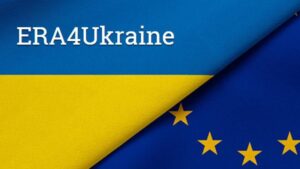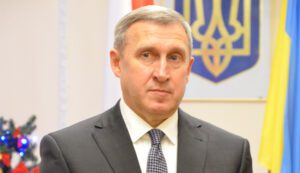
The United States is ready to accept 100,000 refugees from Ukraine, U.S. President Joe Biden said.
Many Ukrainian refugees want to stay in Europe, closer to home, but we also welcome 100,000 Ukrainians to the U.S. with a focus on family reunification, Biden said at a press conference in Brussels on Thursday.

Preliminary entry into Ukrainian universities in 2022 can be carried out on a multi-subject online test (Ukrainian language, history of Ukraine, mathematics), MP from the Holos faction, secretary of the parliamentary committee on education, science and innovation Natalia Pipa said.
“Changes are possible depending on the situation with the front. Today, the following is planned: a multi-subject online test (Ukrainian language, history of Ukraine, mathematics), which must be taken in safe places. Passing at Ukrainian embassies and consulates abroad is being considered. It is planned to be held in July,” Pipa said on Facebook.
At the same time, she said the decision is not final.
“Changes are possible. Testing will continue to be carried out by the Ukrainian Center for Educational Quality Assessment. The Ministry of Education and Science is developing a procedure in detail. The Cabinet of Ministers is to approve,” she said.

The European Commission has launched the ERA4Ukraine portal to provide information and support services to Ukrainian scientists forced to travel abroad due to the war, according to the Ministry of Education and Science of Ukraine.
According to the press service of the ministry, on the portal you can find information about the recognition of diplomas, current vacancies, receiving social assistance and housing offers for scientists and their families.
“The ERA4Ukraine portal will operate within the EURAXESS network, which supports scientists from more than 600 research centers and contains 43 national portals in EU member states and countries that have become associate participants in the Horizon Europe research and innovation program. The portal contains information about support of Ukrainian scientists from 30 countries in English. The Ukrainian version will be available soon,” the report says.
ERA4UKRAINE, EUROPEAN COMMISSION, HELP, UKRAINIAN SCIENTISTS, ПОРТАЛ

“According to the Polish border guard service, about 2 million people have crossed the Ukrainian-Polish border since the beginning of the war, that is, in a month. Now it is difficult to estimate the exact number of those who left the territory of Poland, but this can be understood by the amount of transport. We can say that about 1.5 million people remained in Poland. Another 1.5 million Ukrainians were in Poland before the start of the war. Thus, now there are about 3 million citizens of Ukraine in Poland,” Deshchytsia said in an interview with Interfax-Ukraine.
He stressed that the assistance provided to Ukrainian citizens in Poland deserves great gratitude and praise.
“Ordinary Polish citizens, literally from the first days of the war, went to checkpoints on the Ukrainian-Polish border and met our citizens themselves, mostly women, children, the elderly, picked them up in their cars and took them to their homes,” Deshchytsia said.
According to him, there is also centralized assistance, which is very well organized.
“There is assistance both at the central and local government levels, as well as at the level of civil society. Non-governmental organizations, various foundations, volunteer organizations almost continuously provide assistance to Ukrainians,” the ambassador said.
Deshchytsia added that if we are talking about the level of state support, then at the initiative of the government and unanimous supra-party support in the Senate and the Sejm of Poland, a law on assistance to Ukrainians was adopted, helping the citizens of Ukraine to more easily adapt to the conditions in which they found themselves in Poland.
“Firstly, it allows them to stay in Poland legally for the next 18 months with the right to extend their legal stay in the country for another year and a half, and with the documents they arrived with. Secondly, this is a one-time financial assistance for each person, amounting to approximately PLN 300 [equivalent to $80-100]. Thirdly, it is an opportunity to speed up the employment procedure, the opportunity to receive the same social, medical, and pension benefits that the Poles have. To do this, however, you need to get a Polish identification code. Fourthly, this involves helping Ukrainian children to get them into educational institutions, kindergartens, as well as free education in higher educational institutions,” the Ukrainian ambassador explained.

Ukrainian President Volodymyr Zelensky has said that he has invited Pope Francis to visit Ukraine.
“In the morning, I spoke with His Holiness Pope Francis about the search for peace for Ukraine, for our state, about the atrocities of the invaders, about humanitarian corridors to the surrounded cities. I thanked His Holiness for a clear and strong position against the war and for prayers for Ukraine. I invited him to visit our state at this crucial time. I believe that we will be able to organize this important visit, which will definitely support every one of us,” Zelensky said in a video address in the early hours of Wednesday.
Zelensky said earlier that he would welcome the Vatican’s role as a mediator to stop human suffering in Ukraine.